

Scientific American Endorses Joe Biden. Scientific American has never endorsed a presidential candidate in its 175-year history.
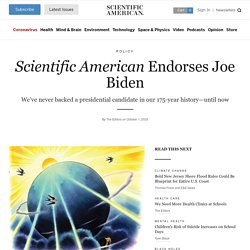
Why deforestation and extinctions make pandemics more likely. As humans diminish biodiversity by cutting down forests and building more infrastructure, they’re increasing the risk of disease pandemics such as COVID-19.
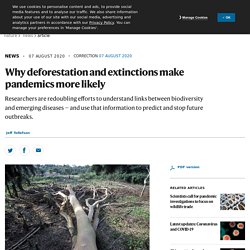
Many ecologists have long suspected this, but a new study helps to reveal why: while some species are going extinct, those that tend to survive and thrive — rats and bats, for instance — are more likely to host potentially dangerous pathogens that can make the jump to humans. The analysis of around 6,800 ecological communities on 6 continents adds to a growing body of evidence that connects trends in human development and biodiversity loss to disease outbreaks — but stops short of projecting where new disease outbreaks might occur. “We’ve been warning about this for decades,” says Kate Jones, an ecological modeller at University College London and an author on the study, published on 5 August in Nature1.
The race for coronavirus vaccines: a graphical guide. More than 90 vaccines are being developed against SARS-CoV-2 by research teams in companies and universities across the world.
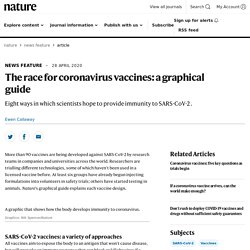
Researchers are trialling different technologies, some of which haven’t been used in a licensed vaccine before. At least six groups have already begun injecting formulations into volunteers in safety trials; others have started testing in animals. Why deforestation and extinctions make pandemics more likely. Security Council Adopts Resolution on Cessation of Hostilities during Pandemic. IHR 2005 in the Coronavirus Pandemic: A Need for a New Instrument to Overcome Fragmentation? Unprecedented Pandemic and Splintered Global Response With 182 countries reporting 6,663,304 confirmed cases with 392,802 deaths (as of Jun. 6, 2020) and activating various national emergency measures, the outbreak of novel coronavirus in 2020 stands to be recorded as the worst global health disaster in recent history.
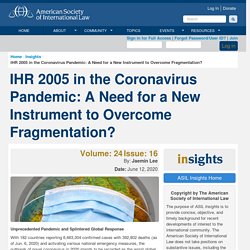
Amid unprecedented uncertainties swirling around almost all sectors of the global community, the COVID-19 pandemic has also raised complex legal issues, which require systematic analysis once the current crisis is brought under control. Most notably, global guidelines and detailed manuals for responding specifically to a pandemic are not readily available. The World Health Organization (WHO) plays a crucial role, but is largely confined to gathering statistics, disseminating information, and issuing recommendations, instead of serving in the role of a global coordinator liaising between international organizations and governments. The Fragmentation Problem in IHR 2005. Six months ago in the Washington Post.
China warned of mysterious virus 6 months ago. Here’s where the world is at now. It's been six months since China first reported a cluster of mysterious pneumonia cases in the city of Wuhan.
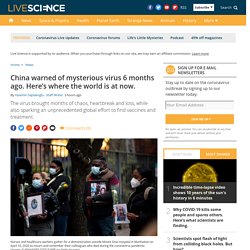
The culprit became known as "SARS-CoV-2," a new virus that had hopped from a still-unknown animal to humans, spreading across the globe like wildfire. The virus has now reached every continent except Antarctica, devastating remote Indigenous populations in the Amazon and spreading in African countries already devastated by other pathogens. China delayed releasing coronavirus info, frustrating WHO. Throughout January, the World Health Organization publicly praised China for what it called a speedy response to the new coronavirus.
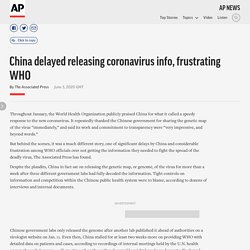
It repeatedly thanked the Chinese government for sharing the genetic map of the virus “immediately,” and said its work and commitment to transparency were “very impressive, and beyond words.” But behind the scenes, it was a much different story, one of significant delays by China and considerable frustration among WHO officials over not getting the information they needed to fight the spread of the deadly virus, The Associated Press has found. Despite the plaudits, China in fact sat on releasing the genetic map, or genome, of the virus for more than a week after three different government labs had fully decoded the information. Tight controls on information and competition within the Chinese public health system were to blame, according to dozens of interviews and internal documents.
Policy Beyond Politics: UN Security Council Needs To Urgently Address COVID-19 - OpEd - Eurasia Review. The inaction by the United Nations Security Council contrasts sharply with what the leading world body did in 1984, when it addressed the EBOLA pandemic in Africa.
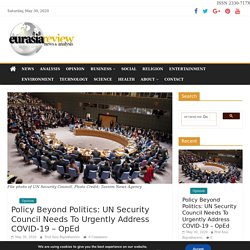
Coronavirus: 'Baffling' observations from the front line. NIH director: ‘No way of knowing’ if coronavirus escaped from Wuhan lab. Why Travel Bans Fail to Stop Pandemics. Why Is President Trump Taking Hydroxychloroquine? The sprint to solve coronavirus protein structures — and disarm them with drugs. Lying in bed on the night of 10 January, scrolling through news on his smartphone, Andrew Mesecar got an alert.

He sat up. It was here. The Wuhan crisis - The coronavirus discovered in China is causing global alarm. CHINA’S LEADER, Xi Jinping, often warns officials to be wary of “black swan risks”, meaning sudden unexpected events that can harm the economy.
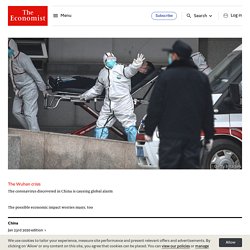
People typically assume he means wobbly banks or trade tensions. But the most immediate threat may be a new, sometimes deadly, virus that appears to be spreading. The outbreak raises dark memories of another one 17 years ago that killed hundreds of people and, briefly, nearly halted China’s growth. The main worry is whether the government can control the virus, which can cause severe pneumonia. We Knew Disease X Was Coming. It’s Here Now. In early 2018, during a meeting at the World Health Organization in Geneva, a group of experts I belong to (the R&D Blueprint) coined the term “Disease X”: We were referring to the next pandemic, which would be caused by an unknown, novel pathogen that hadn’t yet entered the human population.
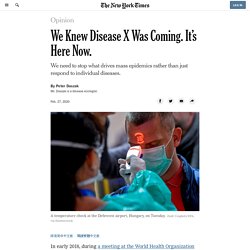
As the world stands today on the edge of the pandemic precipice, it’s worth taking a moment to consider whether Covid-19 is the disease our group was warning about. Disease X, we said back then, would likely result from a virus originating in animals and would emerge somewhere on the planet where economic development drives people and wildlife together. Disease X would probably be confused with other diseases early in the outbreak and would spread quickly and silently; exploiting networks of human travel and trade, it would reach multiple countries and thwart containment.
Disease X would have a mortality rate higher than a seasonal flu but would spread as easily as the flu. COVID-19 and International Law: Must China Compensate Countries for the Damage? The COVID-19 pandemic is wreaking human, economic, and social damage around the world. The scale of the damage has prompted arguments that China bears international legal responsibility for the pandemic and should compensate countries harmed by the outbreak. Lewis Libby and Logan A.
Rank argued in The National Review that “simple justice require[s] that Beijing accept consequences facing any other wrongdoer—including an end to dangerous practices and extending at least partial compensation to those so grievously harmed outside China.” In War on the Rocks, James Kraska asserted that China violated international law on infectious diseases and, under international legal principles of state responsibility, has an obligation to make full reparation for the harm done through, among other things, compensation that could amount to trillions of dollars. At least one class action lawsuit against China has been filed in federal court seeking damages suffered from the COVID-19 pandemic. Don’t Bother Suing China for Coronavirus. There is plenty of blame to go around for the dire personal, social, and economic costs occasioned by the spread of the novel coronavirus, which currently afflicts most countries in the world. As David Fidler wrote in Just Security last week, the World Health Organization updated the International Health Regulations in 2005 in an attempt to prevent the worst harms from precisely this sort of outbreak.
U.S. domestic authorities also prepared plans, including the 2006 National Strategy for Pandemic Influenza promulgated by President George W. Bush and the 2016 Playbook for Early Response to High-Consequence Emerging Infectious Disease Threats developed under President Barack Obama. It seems clear that Chinese authorities failed to adequately report and to contain the spread of this new disease, and that the U.S. Executive Branch botched its response, with highly predictable and deadly results. We Predicted a Coronavirus Pandemic. Here’s What Policymakers Could Have Seen Coming.